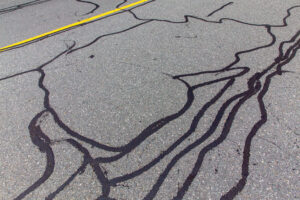If you own any property with an asphalt surface, you know the importance of maintaining it. Asphalt emulsion is one of the substances used in the maintenance and construction of asphalt surfaces. It is a versatile material that has various applications. If you are not familiar with asphalt emulsion or its uses, this post is for you. Below, we will get into the weeds and discuss what asphalt emulsion is, how it is made, and its uses.
What is Asphalt Emulsion?
Asphalt emulsion is a mixture of asphalt, water, and an emulsifying agent. It is a liquid substance that some say looks like mayonnaise in consistency. The main purpose of asphalt emulsion is to act as a binding agent for aggregates in the construction and maintenance of asphalt surfaces. It is commonly used in road construction, pavement maintenance, and other asphalt applications.
How is Asphalt Emulsion Made?
Asphalt emulsion combines asphalt cement, water, and an emulsifying agent to create a stable mixture. The process starts by heating the asphalt cement to between 300°F and 400°F (about 150°C to 205°C). This heating makes the asphalt less viscous and easier to work with. In a separate tank, water is mixed with an emulsifying agent—usually a type of soap or surfactant. This mixture helps keep the asphalt droplets evenly dispersed in the water, preventing them from clumping together.
Once both the heated asphalt and the water-emulsifier mix are ready, they’re fed into a machine called a colloid mill. This mill uses intense mechanical forces to break the asphalt into tiny droplets, typically ranging from 1 to 10 micrometers in diameter. After milling, the mixture is cooled down and stored in tanks. It’s then ready for transportation or use in road construction and maintenance projects. By adjusting the type and amount of emulsifying agent and tweaking processing conditions, manufacturers can customize the emulsion’s properties.
Uses of Asphalt Emulsion
Asphalt emulsion plays a large role in asphalt construction projects. It is typically used in four main ways:
Road Construction and Maintenance
One of the most common applications of asphalt emulsion is in road construction and maintenance. It’s used in techniques like chip sealing, where a layer of emulsion is applied to the road surface followed by a layer of aggregate. This method seals minor cracks and prevents water from seeping into the pavement, extending the road’s lifespan.
Cold Mix Asphalt Applications
Asphalt emulsion enables the production of cold mix asphalt, which doesn’t require heating like other asphalt mixes. This is beneficial in remote areas where heating facilities might not be available. Cold mixes are commonly used for patching potholes and as base layers in road construction projects.
Surface Treatments and Seal Coats
The emulsion is also utilized in various surface treatments, such as fog seals, slurry seals, and micro-surfacing. These treatments protect the pavement from oxidation and weathering and make it look new.
Tack Coats and Bonding Layers
In multi-layer pavement systems, asphalt emulsion acts as a tack coat to bond different layers together. This allows the layers to function as a single, cohesive unit.
Asphalt emersion is versatile and can be created for various pavement applications. It’s commonly used in residential, commercial, and industrial construction projects.
Benefits of Using Asphalt Emulsion
Here are some of the biggest benefits of using asphalt emulsion in projects:
Environmentally Friendly: Since it uses water as a carrier instead of harmful solvents, it significantly reduces the emission of volatile organic compounds (VOCs) into the atmosphere. This means less air pollution and a smaller carbon footprint than traditional asphalt methods.
Cost-Effective and Efficient: Asphalt emulsion is not only good for the environment but also kind to the wallet. It can be applied at lower temperatures, which means less energy is needed for heating. This reduction in energy consumption leads to lower costs.
Versatility: Asphalt emulsion can seal minor cracks and also serve as a binding agent in cold mix asphalt. Its adaptability makes it suitable for different types of repairs and maintenance tasks.
Safety During Application: Applying asphalt emulsion is generally safer for workers. Since it doesn’t require the high temperatures, there’s a reduced risk of burns and heat-related illnesses. Lower application temperatures also mean that the material cools down faster, allowing roads to be driven on faster.
Durability and Performance: Asphalt emulsion treatments can extend the life of pavement by providing a protective layer against water and oxidative aging. This leads to roads that are more resistant to cracking, potholes, and other forms of damage. In the long run, this means fewer repairs and less frequent need for major overhauls.
Easier Maintenance: Asphalt emulsion treatments are easier to maintain than traditional methods. This is because they can be applied in thin layers, making it easier to repair any future damage without having to remove and replace large sections of pavement.
By going with for asphalt emulsion, engineers and maintenance crews can enjoy many benefits—from environmental advantages and cost savings to improved safety and performance. It’s a practical solution that addresses many of the challenges faced in road repair and maintenance. Whether it’s used for preventive maintenance or to repair existing damage, asphalt emulsion is a reliable tool that can help keep roads in good condition for longer periods of time. As technology continues to advance and innovations are introduced, we can expect even more benefits from using asphalt emulsion in the future.
Let Superior Asphalt Maintain Your Asphalt Surface
Asphalt emulsion offers an environmentally friendly, cost-effective, and versatile solution for paving and road maintenance. Its ease of use and range of applications make it a top choice for many contractors and property owners. If you need help using asphalt emulsion to maintain your asphalt surface, contact Superior Asphalt. Our experienced team can provide expert advice and quality services to help you get the most out of your asphalt. Contact us today for more information.





